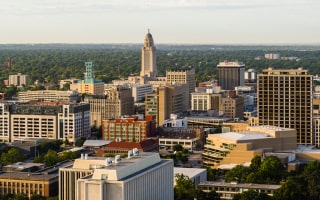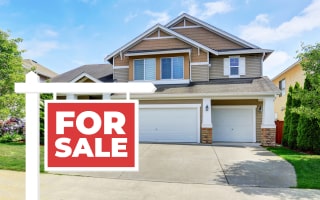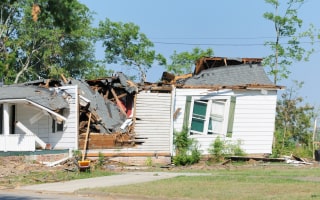Home Buying in Nebraska

Nebraska, the Cornhusker State, is uniquely appealing to homebuyers, whether they desire the peace and tranquility of wide-open spaces, the community spirit of a small town, or the urban lifestyle in one of its bustling cities. From the vibrancy of cities like Lincoln and Omaha to the rural Sandhills, Nebraska offers something for everyone. A stable economy rooted in agriculture, manufacturing, and a growing tech sector, with a low cost of living and family-friendly atmosphere, make it an attractive choice for those looking to settle in America's heartland.
Nebraska boasts relatively low unemployment numbers, high quality of life, and access to excellent schools and healthcare facilities, offering homeowners many diverse opportunities within its housing market. Like anywhere else in the country, Nebraska's real estate market has unique challenges and advantages homebuyers must consider when buying a home.
Across the board, the median home price in Nebraska is $280,000, significantly lower than the national average. Even with slightly higher prices in some of the more popular urban areas, like in and around Omaha, Nebraska still boasts a lower median home price than neighboring states like Iowa, Kansas, Missouri, and South Dakota.
The state's housing market is relatively competitive, with rising home prices and sales and many homes selling above the list price. On average, homes stay on the market in Nebraska for about 19 days.
Although there is some migration into the state, Nebraska has experienced a net out-migration, with an estimated 50,000 people leaving annually, even as nearly 45,000 people move in from other states yearly. More and more homeowners are attracted to the state thanks to its low cost of living, strong job market, and slower pace, even in the state's urban areas.
Before entering the Nebraska housing market, you must understand the trends, regional differences, and factors influencing it. Once you have a firm grasp on home buying in Nebraska, you'll want to take several steps crucial in finding the right home for you, not the least of which is working with a local real estate agent who understands what sets Nebraska apart from other housing markets across the country.
Nebraska Housing Trends
Housing trends can directly influence home-buying decisions in Nebraska. While the housing market may not be as fast-paced as it is in other areas of the country, Nebraska has its own unique dynamics that may influence your purchase.
Here are some important facts and figures:
-
Nebraska's Median Home Price
Nebraska's median home price is around $280,000, significantly lower than the national average. This affords many home buyers, especially those making their first home purchase, more opportunities to enter the market. That said, home prices in Nebraska will vary depending on where you are in the state. In Omaha and Lincoln, median home prices can be as high as $350,000, while smaller towns and rural areas may have housing options with more affordable price tags, sometimes dipping as low as $200,000.
-
Number of Houses Sold in Nebraska
Nebraska home sales have remained quite stable in the last decade, though there have been fluctuations due to population shifts, economic conditions, and the pandemic. In 2023, approximately 40,000 homes were sold in Nebraska, with many of those sales occurring in the Omaha-Lincoln metropolitan area. The Nebraska housing market has also experienced a steady rise in the demand for single-family homes, particularly in suburban and rural areas. This is due, in part, to more homebuyers seeking the affordability and spaciousness that Nebraska offers.
-
Median Days on Market
Nebraska's median Days on Market (DOM) figure is generally lower than national averages, with a median DOM of approximately 19 days. This figure may vary sharply depending on location, with homes selling even faster in the state's most popular regions. However, rural Nebraska homes can stay on the market for double, even triple, the median DOM.
-
Housing Supply Statistics
Nebraska has managed to maintain a relatively stable housing supply, although some of the more populated urban areas have experienced shortages, leading to an increased demand. New construction sometimes lags in those areas, unable to meet the needs of the housing market. Nebraska's housing supply is more balanced in rural parts of the state, though these homes are relatively older and may require significant work.
How to Find the Right Home to Buy in Nebraska

Financial planning and careful consideration are keys to home buying in Nebraska. That includes considering important factors like current market conditions and the type and location of the home you buy. Regardless of where you end up, several key aspects will help you make a homebuying decision that meets your unique lifestyle and particular budget. A Nebraska real estate professional will play an essential role in this process.
Location
Location is always a leading factor when buying a home in Nebraska. The state offers a diverse choice of locations, from urban centers to quiet rural communities, each with its own unique characteristics, so you'll want to think about the following options:
-
The Urban lifestyle vs. Rural living: Nebraska's urban areas deliver a range of amenities like easy access to shopping, dining, entertainment, and quality healthcare. In cities like Omaha and Lincoln, the state's greatest economic hubs, homebuyers can access various job opportunities in multiple sectors, from healthcare and education to finance and technology. However, the cost of living in Nebraska's urban areas is generally higher than in other parts of the state, and homes tend to be more expensive. In contrast, living in rural Nebraska offers more affordable housing options and a much slower pace of life. Whether in Central Nebraska, the Sandhills, or the Panhandle region, you'll enjoy wide-open spaces, a closer connection to nature, and many agricultural opportunities.
-
Proximity to work and schools: When choosing the right location, Nebraska homebuyers must consider employment access and the quality of the area's public schools. Nebraska has a strong education system, with many school choices and an overarching goal to ensure students are college and career-ready upon graduation. Since proximity to schools is often a priority for homebuyers with families, it can also affect your home's long-term value. If you work outside the home, consider your commute. While Nebraska traffic is generally lighter than in other states, living too far from your workplace can result in longer commute times, particularly in winter when snow and ice can affect Nebraska road conditions.
-
Property Taxes: Nebraska's property taxes are levied by local governments. The state's average effective property tax rate is 1.61%, which is relatively higher than the US average. The property tax rate occasionally exceeds 2% in some of the state's largest countries.
Nebraska Home Types
In Nebraska, homebuyers can expect to find a variety of home types that can suit diverse needs and preferences. From traditional single-family homes to multi-family properties and many options in between, there are plenty of different housing types available to Nebraska homebuyers.
-
Single-Family homes: Nebraska's most common type of housing is the single-family dwelling. These homes offer space, privacy, and autonomy. They range from old houses in historic neighborhoods to new, modern builds in suburban housing developments.
-
Multi-family homes: These homes, which include duplexes, triplexes, and quadplexes, are most common in the state's more urban areas, where the demand for rental properties is high. However, they can also be found in the suburbs and smaller communities.
-
Condominiums and townhouses: Condominiums and townhouses are popular for homebuyers who want a low-maintenance investment. For example, multi-family homes, condos, and townhouses are generally found in urban areas. They offer the benefits of homeownership without all the maintenance responsibilities. They are ideal for young professionals, retirees, and anyone who appreciates convenience and community living.
-
Rural properties: Nebraska's rural areas offer unique homeownership opportunities for homebuyers interested in agricultural pursuits or living in wide-open spaces. Rural properties in Nebraska range from small hobby farms to large ranches and properties with many acres of working farmland. If you want to engage in activities like farming, gardening, or raising livestock, you'll want to consider buying a home in one of Nebraska's rural regions.
The Home Buying Process in Nebraska
Because of Nebraska's housing market conditions and geographic diversity, the home-buying process may be unique to this area of the country, but generally, the home-buying process in Nebraska is as follows:
- Get prequalified for a home loan.
- Partner with a local real estate agent.
- Make an offer.
- Schedule a home inspection.
- Close on your new home.
Financing Your Nebraska Home Purchase

Various options are available to finance a home in Nebraska. A firm grasp of the financing options and an understanding of how they work will help you choose the best financing method.
![]() Traditional Home Loans
Traditional Home Loans
There are two types of traditional mortgages generally available to homebuyers in Nebraska:
- Fixed-rate mortgages: Fixed-rate mortgages are one of the most popular lending options because they maintain the same interest rate for the life of the loan. They provide stability in monthly payments and are ideal for anyone who plans to stay in their home long term.
- Adjustable-rate Mortgages (ARMs): ARMs often start with lower initial rates than fixed-rate mortgage options. However, the interest rates fluctuate based on market conditions, which can be risky for some buyers. ARMs benefit Nebraska homebuyers who expect to move or refinance within a few years.
When seeking a traditional mortgage in Nebraska, homebuyers have several state and regional lenders, including the First National Bank of Omaha, Wells Fargo, Union Bank & Trust, and Platte Valley Bank.
![]() Government-Backed Loans
Government-Backed Loans
Nebraska homebuyers can also qualify for several government-backed home loan options, including:
- FHA (Federal Housing Administration) Loans: FHA loans are designed to assist low-to-moderate-income buyers. They often help reduce down payment costs and have more lenient credit requirements than conventional loans.
- VA (Veterans Affairs) Loans: VA loans are available to veterans and active military members. They offer great benefits, including no down payment and competitive interest rates.
- USDA (United States Department of Agriculture) Loans: For buyers in rural parts of Nebraska, USDA loans provide zero down payment options and competitive interest rates.
Down Payment Assistance Programs in Nebraska
- Nebraska Investment Finance Authority (NIFA) programs: NIFA provides several programs that assist with down payments and closing costs, allowing buyers to access affordable financing options.
- Local Programs: Many Nebraska counties and cities have down payment assistance initiatives. Check with your local housing authority for additional resources.
Nebraska Home Insurance

When buying a home in Nebraska, you must also consider the state's home insurance market. While homeowners insurance is not a legal requirement, it is required by most lenders. Nebraska has diverse weather patterns, including a high risk of severe storms and tornadoes, and its unique climate can significantly impact insurance rates and coverage options.
Here are some factors affecting home insurance in Nebraska
- Cost: While Nebraska’s homeowners insurance rates are generally lower than the national average, they often vary based on location, home value, and risk factors, like proximity to storm paths or flood zones. This could result in the need for additional coverage that could cost an additional $800 or more a year.
- Coverage options: While standard homeowners insurance policies will typically cover storm damage, theft, and liability, certain additional coverage may be required for those living in high-risk areas.
- Available discounts: Many home insurance providers offer discounts for homes with updated safety systems and storm-resistant features. Although these upgrades can be costly, they can help protect your family during a natural disaster and help reduce your insurance premiums.
Home Buying Challenges in Nebraska
While Nebraska's housing market is generally a welcoming environment for homebuyers, prospective buyers should be aware of some challenges that are unique to the state, including:
-
Down payments: Even though the state has a relatively low cost of living, first-time homebuyers often struggle to make a down payment on a home. That is why it is imperative homebuyers explore down payment assistance programs offered in Nebraska and devise savings strategies to make homeownership more attainable.
-
Inventory shortages: Certain parts of Nebraska, particularly around urban centers, are facing inventory shortages. Finding a home that meets your needs may be a challenge. These shortages can also increase buyer competition, especially in more desirable areas.
-
Weather risks: Nebraska is known for its unpredictable weather, including severe storms and tornadoes. Homebuyers should carefully consider a home's location and any storm mitigation features and ensure they purchase the right insurance coverage.
-
Rural living challenges: Rural living certainly has benefits, but it can also be challenging, especially for those without experience living in a rural area. Often, rural communities have limited access to amenities, longer commute times, and fewer job opportunities. Be sure to weigh the pros and cons before purchasing a home in rural Nebraska.
Nebraska Home Inspections
Nebraska is no stranger to extreme weather and experiences frequent high winds, heavy rainstorms, lightning, hail, and tornadoes. This type of climate is ripe for property damage. That is why a Nebraska home inspection is crucial before buying real estate. Conducting a home inspection in Nebraska can help the buyer make an informed decision by revealing hidden problems and avoiding costly repairs. If the inspection uncovers problems, the buyer may have some negotiating power.
A home inspection in Nebraska examines the structural integrity of the home, the safety features, appliances, and major systems. Some of the items checked will be:
-
Exterior: Foundation (cracks or crumbles indicate problems), drainage, septic, leach field, siding, trim, windows, doors, porches, decks, walkways, driveways, and roof (shingles, flashing, vents, chimneys). They are examining the house's structural integrity to ensure it is livable.
-
Interior: Floors, ceilings, walls, stairs, doors, windows.
-
Appliances: Built-in and free-standing appliances that come with the home (refrigerator, oven, stove, range, washer/dryer, and dishwasher).
-
Plumbing: Pipes, water heaters, sinks, tubs, toilets, showers, drains, etc.
-
Electrical: Wiring, panels, outlets, and light fixtures.
-
Heating and Cooling: HVAC units, furnaces, boilers, and ductwork.
-
Insulation and Ventilation: Attics, crawlspaces, basements, and insulation.
-
Fireplaces: Chimneys, flues, and vents.
-
Other Issues: The inspector will also look for any rodent damage, water leakage, mold, termites, or other issues.
A Nebraska home inspection costs between $200 and $550. A standard inspection of an average-sized house will be around $410. Pre-listing five-point inspections may only cost $280.
The Process
Most often, buyers pay for a home inspection in Nebraska because it benefits them the most. Rarely, a seller may opt for a pre-listing inspection to ensure a smooth sale. The process looks as follows:
- Find and hire a reputable home inspection firm.
- Schedule the inspection according to your purchase contract.
- Show up and stay for the entire inspection; ask questions as needed. The inspection will last two to three hours.
- Review the inspection report and decide what to do next.
The top five home inspection companies in Nebraska are:
- Home Standards Inspection Services - Omaha, NE
- Midlands Home Inspections - Papillion, NE
- SRE Home Inspections - Omaha, NE
- It's Your Home Inspection, LLC - Bellevue, NE
- Webber Home Inspections - Lincoln, NE
After the Inspection
After the inspection, the inspector will take the time to detail their findings in a written report, which they will then submit to the buyer, real estate agent, and lender (if needed). The buyer then has some options as follows:
- Save money by negotiating a lower price.
- Ask the seller to make all repairs before closing.
- Ask for a home warranty.
- Back out of the sale altogether.
- Ask to put down less for the down payment.
Inspection Top Cities
| City | Inspection Cost | Local Issues | Local Rules | Local Home Types |
|---|---|---|---|---|
| Home Inspection in Omaha | $300-$500 depending on the home's size, age, and complexity of the inspection. | Roof, electrical wiring, HVAC, and plumbing. | Inspectors must register with the Secretary of State and must comply with Omaha's code of ordinances for inspections. | Traditional houses, condos, townhouses, and new construction. |
| Home Inspection in Lincoln | $300-$500 based on the size and age of the home. | Roofing, foundation problems, electrical issues, plumbing, and mold. | Inspectors must register with the Secretary of State and must comply with Omaha's code of ordinances for inspections and maintain a certificate of Insurance for $250,000 | Single-family homes, townhouses, and apartments. |
| Home Inspection in Grand Island | $300-$500 based on the size of the home and any additional services requested like a termite exam. | Electrical, plumbing, roof, foundation, and water damage. | Inspectors must register with the Secretary of State | Single-family, condos, townhomes, duplexes, and land. |
| Home Inspection in Kearney | $300-$500 based on the home's size and age. | Foundation, structural integrity, electrical, drainage, and HVAC. | Inspectors must register with the Secretary of State | Single-family homes, condos, and townhomes. |
| Home Inspection in Fremont | $350-$500. Some inspectors charge a flat rate for a standard inspection. | Plumbing, electrical, HVAC, mold, foundation, and roof problems. | Inspectors must register with the Secretary of State | Single-family, condos, townhomes, duplexes, or triplexes. |
The Nebraska Housing Market: Diverse and Growing
Nebraska's housing market is unique in its diversity, affordability, and a strong sense of community throughout the state. From its vibrant cities to its picturesque rural regions, it offers a unique blend of home-buying opportunities. As more people are drawn to the benefits of living in the state, the demand for housing will likely continue to grow, particularly in metro areas.
Despite its challenges, Nebraska offers homebuyers affordability, a high quality of life, access to the great outdoors, and many cultural activities. If you take the time to understand the local market dynamics, work with an experienced real estate professional, and conduct thorough research, you'll navigate the home-buying process successfully.
Whether you are a first-time homebuyer, looking to relocate to the area, or seeking a second home in a rural setting, Nebraska's real estate market offers many opportunities to explore. With its strong sense of community, diverse housing options, and a welcoming atmosphere, Nebraska could be the perfect place for you to call home.
Instant Access to Nebraska Property Records
- Owner(s)
- Deed Records
- Loans & Liens
- Values
- Taxes
- Building Permits
- Purchase History
- Property Details
- And More!